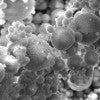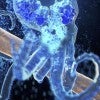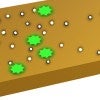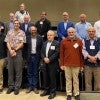
Rare earth elements await in waste
Rice University scientists applied their flash Joule heating process to coal fly ash and other toxic waste to safely extract rare earth elements essential to modern electronics and green technologies.

Rare earth elements await in waste
Rice University scientists applied their flash Joule heating process to coal fly ash and other toxic waste to safely extract rare earth elements essential to modern electronics and green technologies.

Matthew Jones wins NSF CAREER Award
Rice chemist Matthew Jones wins an NSF CAREER Award to study controlled growth of metallic nanoparticles for biomedicine, energy storage and computing.

Machine learning fine-tunes flash graphene
Rice University scientists are using machine learning techniques to streamline the process of synthesizing graphene from waste through flash Joule heating.

Now you don’t see it … and now you do
Scientists and engineers from Rice University and the Kuwait Institute for Scientific Research discover fluorescence from silicon nanoparticles in cement and show how it can be used to reveal early signs of damage in concrete structures.

Antibody with engineered peptide targets bone metastasis
A moderate amount of a peptide-enhanced cancer drug goes a long way in treating breast cancers that metastasize to the bone.

When graphene speaks, scientists can now listen
Brothers working in a lab at Rice University discover that sound can be used to analyze the properties of laser-induced graphene in real time.

People, papers and presentations for Jan. 18, 2022
Rice chemist James Tour is among 32 investigators in five countries who will collaborate on the “Mend the Gap!” project to heal spinal cord injuries.

Migrating holes help catalysts be productive
A theoretical model suggests electron holes that propagate at active sites on a catalyst migrate, triggering other sites that continue the process.

Quirky kveik’s yeasty questions no match for freshmen chemistry students
How Carrie McNeil’s Introduction to Scientific Research Challenges course helped a Houston brewery solve a salty problem

Peter Rossky was honored with a symposium Dec. 6-7 at Rice's BioScience Research Collaborative.

Rice’s Technology Development Fund backs faculty projects
Nine projects proposed by Rice researchers have been granted seed funding by Creative Ventures' Technology Development Fund.

People, papers and presentations for Dec. 6, 2021
The Federal Reserve Bank of Dallas has appointed Peter Rodriguez, dean of the Jones Graduate School of Business, to its Houston Branch board of directors, and assistant professor of chemistry Julian West has won a Thieme Chemistry Journals Award for early career synthetic chemists.

Rice profs among historic Greek heroes
Two Rice professors are among physicians and biomedical researchers honored on the Greece bicentennial.

People, papers and presentations for Nov. 22, 2021
People, papers and presentations for Nov. 22, 2021

Rice lab first to mimic molecule found in poppies
A Rice undergraduate leads the discovery of a way to synthesize a rare molecule drawn from poppies.